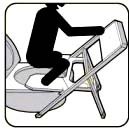|
The Five Categories of Pelvic Organ Prolapse - Rectocele, Cystocele, Enterocele, Uterine and Vagina ProlapseThere are five types of pelvic organ prolapse: rectocele, cystocele, enterocele, uterine prolapse and vagina prolapse.
Rectocele (prolapse of rectum) A rectocele occurs when the rectum drops down and protrudes into the back wall of the vagina. It can make it difficult to have bowel movements, and give a sensation of constipation. Some women need to place a finger in the vagina in order to have a bowel movement. Cystocele (prolapse of bladder) A cystocele occurs when the bladder drops down and protrudes into the front wall of the vagina. A cystocele can lead to urinary incontinence (leakage of urine when coughing, laughing, sudden increase of pressure in the abdomen, or leakage of urine when the bladder becomes too full). SIDENOTE Enterocele (prolapse of small intestine) An enterocele occurs when the small intestine bulge downward and protrudes into the vagina, between the rectum and uterus (womb). An enterocele may not cause any symptoms, but some women experience a sense of fullness or feel pressure or pain in the pelvis and lower back.
Uterine prolapse (prolapse of uterus) A prolapse of the uterus is also known as procidentia. It occurs when the uterus drops down into the vagina. A uterus prolapse may cause pain in the lower back and make urinating difficult. In the case of total uterine prolapse, the uterus drops all the way through the opening of the vagina. It can cause great pain, sores on the cervix (entrance to the uterus), bleeding, discharge and infection. Vagina prolapse A prolapse of the vagina, also known as a vagina vault, occurs when the upper part of the vagina drops down into the lower part, and the vagina turns inside out. (A vagina prolapse only in women who have had a hysterectomy.) Vagina prolapse may lead to a need to urinate frequently, or make urinating difficult. Having a bowel movement may also be difficult. |
The Best Toilet Converter in The World Today!


Helping People All Over
The World Achieve
Good Health Through
Correct Toileting Posture
Watch video on the
origin and story of
the Sandun-Evaco
toilet converter
All about Life,
Hope and Truth...
FREE:
One of the most
astounding books
you will ever read
in your life!




